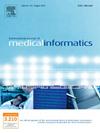Predicting cancer survival at different stages: Insights from fair and explainable machine learning approaches
IF 3.7
2区 医学
Q2 COMPUTER SCIENCE, INFORMATION SYSTEMS
International Journal of Medical Informatics
Pub Date : 2025-02-13
DOI:10.1016/j.ijmedinf.2025.105822
引用次数: 0
Abstract
Objectives
While prior machine learning (ML) models for cancer survivability prediction often treated all cancer stages uniformly, cancer survivability prediction should involve understanding how different stages impact the outcomes. Additionally, the success of ML-powered cancer survival prediction models depends a lot on being fair and easy to understand, especially for different stages of cancer. This study addresses cancer survivability prediction using fair and explainable ML methods.
Methods
Focusing on bladder, breast, and prostate cancers using SEER Program data, we developed and validated fair and explainable ML strategies to train separate models for each stage. These computational strategies also advance the fairness and explainability of the ML models.
Results
The current work highlights the important role of ML fairness and explainability in stage-specific cancer survivability prediction, capturing and interpreting the associated factors influencing cancer survivability.
Conclusions
This contribution advocates for integrating fairness and explainability in these ML models to ensure equitable, fair, interpretable, and transparent predictions, ultimately enhancing patient care and shared decision-making in cancer treatment.
求助全文
约1分钟内获得全文
求助全文
来源期刊

International Journal of Medical Informatics
医学-计算机:信息系统
CiteScore
8.90
自引率
4.10%
发文量
217
审稿时长
42 days
期刊介绍:
International Journal of Medical Informatics provides an international medium for dissemination of original results and interpretative reviews concerning the field of medical informatics. The Journal emphasizes the evaluation of systems in healthcare settings.
The scope of journal covers:
Information systems, including national or international registration systems, hospital information systems, departmental and/or physician''s office systems, document handling systems, electronic medical record systems, standardization, systems integration etc.;
Computer-aided medical decision support systems using heuristic, algorithmic and/or statistical methods as exemplified in decision theory, protocol development, artificial intelligence, etc.
Educational computer based programs pertaining to medical informatics or medicine in general;
Organizational, economic, social, clinical impact, ethical and cost-benefit aspects of IT applications in health care.
 求助内容:
求助内容: 应助结果提醒方式:
应助结果提醒方式:


